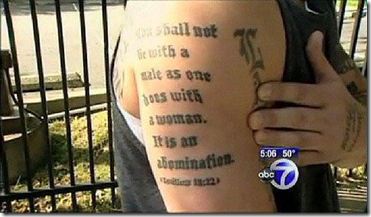Here is a tweet I saw today:
“Tattoo of Leviticus 18:22 forbidding homosexuality: £200. Not knowing that Leviticus 19:28 forbids tattoos: Priceless.”
The accompanying picture (below) was of a tattoo carrying the biblical text Leviticus 18:22
Leviticus 18:22 clearly states:
“You shall not lie with a male as one lies with a woman. It is an abomination”
But what about the injunction in in the next chapter forbidding tattoos? A clear example of selective use of the Bible text it seems, a charge often brought by supporters of “gay rights” who love to talk about shell fish, mixed fibres and other such exotic and seemingly bizarre subjects mentioned as important and forbidden in the Bible.
Leviticus 19:28 states:
“You shall not make any cuts on your body for the dead or tattoo yourselves: I am the LORD.”
A priceless mistake? I don’t think so. You see, the verse is not forbidding the use of tattoos as such but the mutilation of the body in worship of false gods – as in 1 Kings 18:28
“And they cried aloud and cut themselves after their custom with swords and lances, until the blood gushed out upon them.”
The tattoos, likewise, were made as a form of worship. The error here is on the part of the person who has hastily tweeted the story without finding out what the Bible actually says. It is what happens when you stop listening as soon as you hear what you want to hear.
It is all of it about not being like the heathens, not joining in with, or adopting their abominable practices. God’s people are to be holy and that has always meant set apart for exclusive service to God.
Matthew Henry explains this whole section of Scripture very well:
A law against the superstitious usages of the heathen, Lev_19:26-28.
1. Eating upon the blood, as the Gentiles did, who gathered the blood of their sacrifices into a vessel for their demons (as they fancied) to drink, and then sat about it, eating the flesh themselves, signifying their communion with devils by their feasting with them. Let not this custom be used, for the blood of God's sacrifices was to be sprinkled on the altar, and then poured at the foot of it, and conveyed away.
2. Enchantment and divination, and a superstitious observation of the times, some days and hours lucky and others unlucky. Curious arts of this kind, it is likely, had been of late invented by the Egyptian priests, to amuse the people, and support their own credit. The Israelites had seen them practised, but must by no means imitate them. It would be unpardonable in those to whom were committed the oracles of God to ask counsel of the devil, and yet worse in Christians, to whom the Son of God is manifested, who has destroyed the works of the devil. For Christians to have their nativities cast, and their fortunes told them, to use spells and charms for the cure of diseases and the driving away of evil spirits, to be affected with the falling of the salt, a hare crossing the way, cross days, or the like, is an intolerable affront to the Lord Jesus, a support of paganism and idolatry, and a reproach both to themselves and to that worthy name by which they are called: and those must be grossly ignorant, both of the law and the gospel, that ask, “What harm is there in these things?” Is it no harm for those that have fellowship with Christ to have fellowship with devils, or to learn the ways of those that have? Surely we have not so learned Christ.
3. There was a superstition even in trimming themselves used by the heathen, which must not be imitated by the people of God: You shall not round the corners of your heads. Those that worshipped the hosts of heaven, in honour of them, cut their hair so as that their heads might resemble the celestial globe; but, as the custom was foolish itself, so, being done with respect to their false gods, it was idolatrous.
4. The rites and ceremonies by which they expressed their sorrow at their funerals must not be imitated, Lev_19:28. They must not make cuts or prints in their flesh for the dead; for the heathen did so to pacify the infernal deities they dreamt of, and to render them propitious to their deceased friends. Christ by his sufferings has altered the property of death, and made it a true friend to every true Israelite; and now, as there needs nothing to make death propitious to us (for, if God be so, death is so of course), so we sorrow not as those that have no hope. Those whom the God of Israel had set apart for himself must not receive the image and superscription of these dunghill deities.
5. The prostituting of their daughters to uncleanness, which is here forbidden (Lev_19:29), seems to have been practised by the heathen in their idolatrous worships, for with such abominations those unclean spirits which they worshipped were well pleased. And when lewdness obtained as a religious rite, and was committed in their temples, no marvel that the land became full of that wickedness, which, when it entered at the temple-doors, overspread the land like a mighty torrent, and bore down all the fences of virtue and modesty. The devil himself could not have brought such abominations into their lives if he had not first brought them into their worships. And justly were those given up to vile affections who forsook the holy God, and gave divine honours to impure spirits. Those that dishonour God are thus suffered to dishonour themselves and their families.

No comments:
Post a Comment